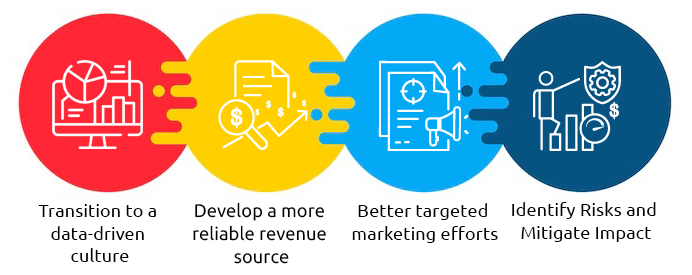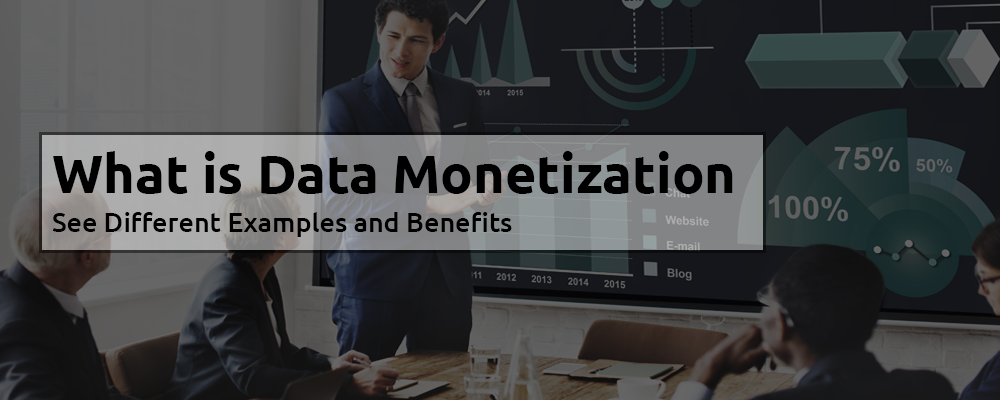Data is a digital representation of all the information and knowledge collected or generated by a system, organization, or network. Monetization is the process of making data monetizable. This means that it allows the creation of new services and products. Monetizing data is an essential skill for any potential creator, vendor, or user of data. The main advantage of data monetization is that it makes data accessible to anyone in any field. In addition, it makes data easily transferable and an easy way for developers to create new software. Data monetization also generates valuable information and generates income for the individuals who own or distribute it.
There are multiple ways companies can turn data into money, and this process is essential for creating user interfaces and maintaining software updates. However, data monetization can be controversial since companies can make money off the personal information of their users. Essentially, user consent is key in implementing this innovative monetization technique. Data monetization refers to the process of turning data into money. Companies can use this process to generate additional revenue from users’ data. For example, companies can use user data to create targeted advertisements. This enables them to earn revenue while maintaining user privacy.
What is Data Monetization?
Data monetization is the process of converting data into revenue. Data is an asset and can be used in various ways to generate revenue. There are many ways that a company can use its data as an asset, such as through licensing, sale, or advertising.
There are two ways through which data monetization can be done
Internal data monetization:
Internal data monetization aims to improve internal processes such as marketing and customer experience or maintenance of equipment. This method uses data and analytics to make an informed business decision that translates into measurable improvements in the way a company does business.
External data monetization:
External data monetization involves using data to expand an organization’s product offering with data-driven services or business models to create new revenue streams. This method is used to create a product or service using your internal data assets and a method to sell them to a third party.

What are the benefits of Data Monetization
There are many benefits of data monetization when implemented properly. It allows companies to access new revenue sources from data generated from their users’ interactions with their products and services.

New opportunities in the market
To identify new opportunities in the markets, an organization must have a good understanding of the data and identify the value of the data they collect. With appropriate data volumes, it leverages untapped and tapped information to develop new revenue sources.
Increases the value of data
Companies like Google and Facebook eliminate all activities associated with a user, thus gaining interests, income level, purchase preferences, etc. Most companies identify partners to enhance internal data and enhance data value.
Increases overall productivity
Data analysis provides useful insights only when you measure the right data. You can use the data to increase productivity or reduce consumption and waste. Also, it helps you to improve the sales performance and reduce the attractiveness of the customers. By monetizing your data, you understand your target customers and create meaningful segments that segment the data according to the needs of your target audience.
Gain a competitive advantage in the market
Data is now a vital tool for businesses to use, regardless of the sector they operate in and whether they are global companies or small firms. Many companies like Amazon, and Netflix monetize data by gaining a closer understanding of their customers. By analyzing customer data, they offer highly relevant products and services and create a competitive advantage in the market.
Improves Customer Experience
The term “customer experience” refers to how customers see your brand as they interact with it at various touchpoints. Data monetization helps to ascertain understanding of customer insights and can improve your product and services. Improving the customer experience can also benefit your business in the form of increased customer satisfaction, brand loyalty and sales.
Helps strengthen partnership
Buying and selling of data take place in a data marketplace. If you are a data owner, you can set data prices and consumers can choose from who they wish to buy data. It improves data sharing and collaboration between internal and external stakeholders
Improves decision making and planning
The data marketplace divides the audience and offers the right set of consumers for the right type of data. It gives a depth of insight that allows decision-makers to better understand their business, anticipate market changes, and manage risk better.
Data Monetization Strategies
Whether optimizing business performance or packaging insights for sale to third parties, an effective data monetization strategy should present the clearest route to extracting insights from big data. The strategy should define the need to establish a solid IT foundation with a well-governed, centralized data store, advanced analytics, and various business intelligence (BI) tools.
Every successful enterprise wants to earn maximum revenue to flourish and grow. However, many organizations are not aware that the data they collect daily can be a significant source of revenue for them. More and more organizations are hopping on the data monetization train as they realize that data is becoming increasingly invaluable to all industries. Hence it is even more important to have a data monetization strategy for the coming year. A good data monetization strategy is one that can take your organization to the next level of success.
Top 4 Reasons to Implement a Data Monetization Strategy
Here are the top four reasons why implementing a data monetization strategy can lead to a competitive advantage:

Transition to a Data-Driven Culture
Data is all around us. This is in the form of numbers, spreadsheets, pictures, videos, and many other things. When it comes to monetizing data, the enterprise and its workforce will learn to collect, store, analyze and sell data. This knowledge can be reused to drive digital transformation, especially with data-driven business models.
Develop More Reliable Revenue Streams
A new credible data sales initiative will open new revenue streams to strengthen the bottom line. This revenue can be used in the annual budget to justify further development of data monetization capabilities or to improve internal data usage to drive indirect data monetization.
Better Targeted Marketing Efforts
Whether indirect or direct, marketing data can be monetized to improve paid search growth, organic growth, and optimize sales or landing pages to maximize inbound traffic. In fact, some of the most lucrative data monetization strategies involve determining when, where, and how content reaches potential customers.
Identify Risks and Mitigate Impact
The data can be used to generate insights that reveal hidden risks. By selling this data or indirectly monetizing it internally, businesses can manage market or technology risks and take proactive steps to reduce their impact in the event of a data breach.
Data Monetization Use Cases
Data is precious in any business and from any source. But how to get value from raw data? A company’s data value can increase in three main ways:
- To get all the important details of the customers to get the high value of sale.
- Selling business insights to third parties.
- Generate and collect maximum data from various sources.
How to Monetize Your Data?
Data monetization not only improves business scope but also provides flexibility to make the most of big data from different sources. When a business begins to improve, business users need to think about which monetization approach is best suited for their data strategy. Below are some of the methods for data monetization.
Data as a Service
Data as a Service is the most direct and simplest data monetization method. In this method, the data is sold directly to the customers or intermediate. The data are in the form of raw files or aggregated type or anonymized. Buyers then mine the data with information that is relevant to them. Buyers don’t profit from gaining insights, they take them for themselves. Nor do they benefit from advanced analytics.
Insight as a Service
Insights as a Service involves a combination of internal and external data sources. This information may be sold directly or provided in formats such as analytics-enabled apps that provide updated data. Insights are limited to specific datasets or references that the buyer has purchased.
Analytics-Enabled Platform as a Service
This is the most common and adaptable method that can provide a significant amount of value to the customers. Analytics and BI platform established and implemented to provide highly versatile, scalable data analytics in real time to clients. It is available both on-premises and in the cloud with all kinds of compatibility so that users can access data from any source and any format.
Embedded Analytics
Embedded analytics is the most advanced and interesting method of data monetization that provides the most value to the customers. It includes features associated with business intelligence software such as dashboard reporting, data visualization and data analytics tools. Using this technology, product teams can build and implement customized, actionable analytics apps at scale and integrate them into other applications the company uses.
Data Monetization Examples
Retail Data Monetization
Retail data monetization is the process of optimizing and spending money on how your company uses transaction and customer data. There are two main ways to monetize retail data. The first approach is to use the data for cost reduction by increasing productivity or reducing consumption/waste. Another way involves using data to improve sales or strengthen the customer base.
E-Commerce Data Monetization
E-commerce companies are known for selling products online to provide an easy experience to the customers. When selling products and services online, the business needs to handle a lot of customer data such as their address, contact information, search for products or services, and payment method, etc. While these functions are helpful to the user, they are also all valuable data for the organization. These companies continue to optimize their platforms through customer data, which they invest back into their platforms.
Telecommunication Data Monetization
Telecom companies generally adopt external data monetization methods through a partnership model in the B2B and B2C segments. In some cases, companies have even acquired startups for support. The collected data allows promoters and advertisers to better target messages to specific users.
Conclusion
In this article, we have explained the importance of data monetization in a business. Data monetization gives companies the ability to cut competitive costs and increase revenue. With the many benefits associated with using data monetization, it is clear to see why so many businesses are moving towards using their data more effectively.

Milan Desai
Chief Technology Officer
Milan Desai has more than 20 years of industry experience in working with clients to solve business problems. Passionate about leveraging technology for improving the quality of life and optimize the use of resources. Currently, working on utilizing data to drive business decision making process and user understanding of key metrics that drive the organization and markets in general. Co-founder of EzDataMunch – the first BI Apps store in the world.

